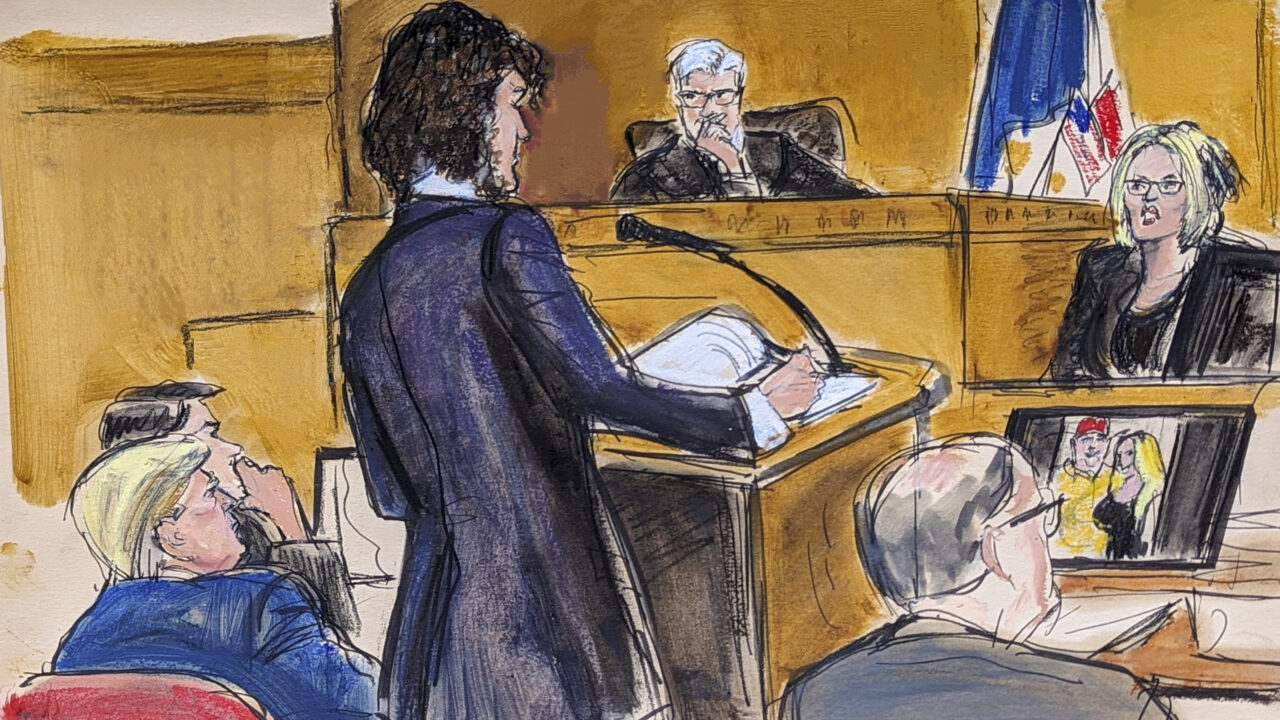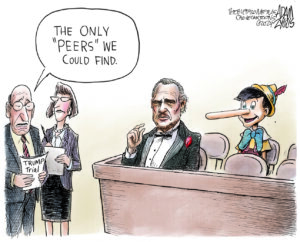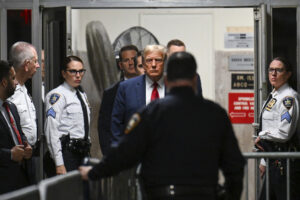Stormy Daniels’ Testimony Highlights Difficulty Women Face on the Stand
Daniels shared vivid details in her testimony. But the Trump trial was a reminder of just how high the bar is to believe women. Judge Juan Merchan presides over proceedings as Stormy Daniels, far right, answers questions on direct examination by assistant district attorney Susan Hoffinger in Manhattan criminal court as former President Donald Trump and defense attorney Todd Blanche look on, Tuesday, May 7, 2024, in New York. (Elizabeth Williams via AP)
Judge Juan Merchan presides over proceedings as Stormy Daniels, far right, answers questions on direct examination by assistant district attorney Susan Hoffinger in Manhattan criminal court as former President Donald Trump and defense attorney Todd Blanche look on, Tuesday, May 7, 2024, in New York. (Elizabeth Williams via AP)
Silk or satin pajamas, Old Spice deodorant and a leather-looking toiletry bag. Stormy Daniels on Tuesday recalled in vivid detail an alleged sexual encounter with Donald Trump nearly two decades ago that, she said, included her spanking him. Daniels described the alleged encounter as consensual — and also said he was “blocking the way” in the hotel room they were in.
Daniels’ expansive testimony in Trump’s criminal trial in Manhattan was historic in nature: An adult film star speaking under oath about an alleged sexual experience with a man who would become president. That man, the former president and presumptive GOP presidential nominee, is now facing a criminal trial, accused of falsifying business records to hide $130,000 in hush money payments to Daniels ahead of the 2016 election.
The criminal charges are not directly about the alleged affair between Trump and Daniels. However, her testimony about their relationship is central — it is what prosecutors allege Trump wanted to hide from voters. Daniels has spoken repeatedly about her alleged relationship with Trump — to the media, in a book, in a recently released documentary. But on the stand, as she was interviewed first by prosecutors and then by Trump’s defense attorneys, the question of when women are believed was also front and center.
In the midst of Daniels’ testimony, attorneys for Trump attempted to use her remarks about their alleged sexual encounter in 2006 to call for a mistrial, claiming she provided too many salacious details and went beyond the scope of a case about alleged falsified business records. Judge Juan Merchan said a mistrial was not warranted, though he acknowledged Daniels is a “little bit difficult to control” and some of her testimony would have been “better left unsaid.” He said he would strike some of her testimony from the trial record.
As she was interviewed first by prosecutors and then by Trump’s defense attorneys, the question of when women are believed was also front and center.
During cross-examination, an attorney for Trump tried to discredit Daniels in part by highlighting her public feelings about the former president.
“Am I correct that you hate President Trump?” asked Susan Necheles, a defense attorney for Trump.
After Daniels responded, “Yes,” Necheles followed up: “And you want him to go to jail?”
“I want him to be held accountable,” she said.
Deborah Tuerkheimer, a professor of law at Northwestern University, has studied what she describes as “credibility discounting” — efforts to discredit someone who is marginalized within our society when they come forward with an allegation against a powerful person.
“It struck me that she’s a woman. It struck me that she works in the adult film industry and has a sexual history of her own that tends to be viewed with disrespect,” she said. “And so on the face of it, she’s sort of coming into it with a number of factors that would suggest that she is likely to have her credibility dismissed.”
The trial is on a break on Wednesday and is set to resume Thursday with more cross-examination of Daniels.
Ciara Torres-Spelliscy, a professor of law at Stetson University College of Law, said in an email to The 19th that Daniels’ credibility might be a deciding factor for the jurors.
“It may matter for some jurors whether they think she made it all up and was just looking for a pay day or whether the encounter between Trump and herself was real and thus potentially extraordinarily damaging to Trump’s electoral chances, especially with American women voters,” said Torres-Spelliscy, who specializes in campaign finance law and constitutional law.
If jurors believe Daniels, they may conclude voters in 2016 would have, too, and so it was important for Trump to cover up their alleged affair.
Torres-Spelliscy pointed out that Trump won the 2016 election by only roughly 80,000 votes in three swing states — making women voters a significant factor. How women outside the courtroom process what is being revealed in the courtroom “may have an enormous impact on the 2024 election too,” Torres-Spelliscy said.
“She’s sort of coming into it with a number of factors that would suggest that she is likely to have her credibility dismissed.”
This is the first of four criminal trials Trump will face, and potentially the only one to happen before the November election. Last year, he was found liable in civil court for sexual abuse and defamation in a case brought by journalist E. Jean Carroll; this year he was again found liable for defaming Carroll. Also this year he was found liable of civil fraud, with a New York judge finding he lied about his wealth and fining him $355 million.
Trump has denied Daniels’ allegations and is currently under a gag order that prevents him from commenting publicly about her. The presiding judge has ordered Trump to pay $10,000 so far for a series of violations to the gag order. His adult son, Eric Trump, appeared alongside his father in court on Tuesday and tweeted during the court proceedings that prosecutors in the case are “giddy by this salacious show. This is the intent, not the merits, nor the fact that this entire case is a massive extortion play.”
The former president has repeatedly denied having an affair with Daniels, accusing her of lying and often criticizing her appearance.
Nicole Bedera is a sociologist who studies sexual violence and credibility. She said her research into credibility comes down to who society thinks “deserves the blame.”
“When people say that a woman isn’t credible, they aren’t necessarily saying they don’t believe her. They’re just saying that they think she’s to blame for what happened,” she said. “Or rather, even if they’re not going to say that she’s to blame for what happened, saying, ‘We can’t be certain that the man on trial is to be blamed for what happened.’”
During the testimony, Judge Merchan at one point reprimanded Daniels, noting she was talking too fast for the court reporter and at times providing irrelevant information that did not stick closely enough to the questions.
Daniels’ demeanor was noticeably different after a lunch break and some journalists in the room noted that it seemed like her answers in the afternoon were less “freewheeling” and more succinct.
The dynamic highlights how difficult it can be for women to be believed in the court of law and navigate a legal landscape that requires consistency and detailed evidence — but only when it’s relevant to the narrow scope of the crime.
“When people say that a woman isn’t credible, they aren’t necessarily saying they don’t believe her. They’re just saying that they think she’s to blame for what happened.”
Daniels’ testimony comes weeks after New York’s highest court ruled to overturn Harvey Weinstein’s 2020 felony conviction — a case central to the #MeToo movement — because the trial court allowed dozens of women that were not the complainants to provide their own testimony detailing Weinstein’s sexual misconduct. Prosecutors were attempting to establish a pattern of behavior by Weinstein and bolster the credibility of victims, but ultimately those extraneous voices and stories worked against the case.
Daniels has been consistent in the last few years about what happened with Trump, describing the same details in interviews, in her 2018 memoir and in a defamation lawsuit filed against Trump six years ago.
“I think it’s fair to say she feels like she was wronged by him. And so to come into court and be able to look at him and take this oath or affirmation, and to promise to tell the truth, I think there’s a power to that,” Tuerkheimer said. “I think it’s different from telling the story in more informal settings or even other kinds of legal settings. This is kind of the pinnacle of importance.”
Trump is the first former president in U.S. history to be charged with either state or federal crimes and is now facing four separate indictments. In this case, he was charged with 34 counts of falsifying business records in the first degree and has pleaded not guilty to all charges.
Still to come from the prosecution is expected testimony from former Trump attorney Michael Cohen, who pleaded guilty in 2018 to paying hush money to Daniels.
Your support matters…Independent journalism is under threat and overshadowed by heavily funded mainstream media.
You can help level the playing field. Become a member.
Your tax-deductible contribution keeps us digging beneath the headlines to give you thought-provoking, investigative reporting and analysis that unearths what's really happening- without compromise.
Give today to support our courageous, independent journalists.






You need to be a supporter to comment.
There are currently no responses to this article.
Be the first to respond.